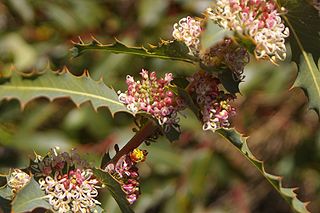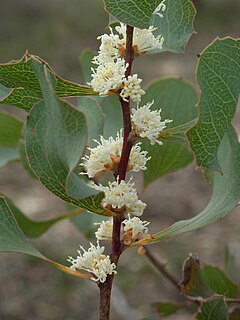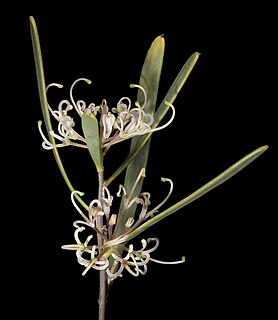
Hakea nodosa, commonly known as yellow hakea, is a shrub that is endemic to Australia. It usually has golden yellow flowers in profusion and needle-shaped leaves.

Hakea amplexicaulis, commonly known as prickly hakea, is a shrub endemic to south west Western Australia. An attractive small shrub with unusual stem clasping, sharply serrated foliage and a profusion of sweetly scented variable coloured flowers from late winter to spring.

Hakea rugosa, commonly known as wrinkled hakea or dwarf hakea, is a shrub of the family Proteaceae native to Australia. It has sharp needle-shaped leaves and white or cream fragrant flowers in profusion from August to October.

Hakea undulata, commonly known as wavy-leaved hakea, is a flowering plant in the family Proteaceae and is endemic to the south-west of Western Australia. It has stiff wavy leaves and fragrant cream-white flowers from mid-winter to October.

Hakea cristata, commonly known as the snail hakea, is a shrub in the family Proteaceae native to Western Australia. An ornamental prickly shrub with attractive foliage and creamy white rounded flowers appearing in profusion in the winter months.

Hakea cucullata, commonly known as hood-leaved hakea, cup hakea or scallop hakea, is a species of shrub in the family Proteaceae and is endemic to the south-west of Western Australia. An attractive shrub with unusual distinctive foliage and beautiful large pink, red or deep purple scented flowers.

Hakea ambigua is a shrub in the family Proteaceae. In favourable conditions may grow into an attractive weeping shrub with creamy white flowers. Only found in the Stirling Ranges of southern Western Australia.

Hakea bicornata is a shrub in the family Proteaceae native to Western Australia, with attractive creamy-white flowers and fruit with two distinctive horns.

Hakea cinerea, commonly known as ashy or grey hakea, is a shrub in the family Proteaceae native to areas along the south coast in the Goldfields-Esperance region of Western Australia. It is a showy ornamental species bearing creamy-white flowers aging to orange with contrasting ash coloured grey-green leaves.

Hakea costata, commonly known as the ribbed hakea, is a shrub in the family Proteaceae native to Western Australia. A multi-stemmed small shrub producing attractive pink or white brush-like blooms rich in nectar from July to October.

Hakea cyclocarpa, commonly known as the ram's horn, wild bean or curved-fruit hakea is a shrub in the family Proteaceae. A strongly scented species with large creamy-white flowers with a red style and interesting fruit. Native to an area along the west coast and south west regions of Western Australia.

Hakea elliptica, commonly known as the oval-leaf hakea, is a shrub in the family Proteacea and is endemic to Western Australia. A fast growing adaptable species with ornamental wavy leaves, golden bronze new growth and an abundance of showy white flowers. A good wildlife habitat due to its dense form with foliage to ground level.
Hakea ilicifolia is an open shrub or tree in the family Proteacea and is endemic to Western Australia. It is a small, dense shrub with stiff, lobed leaves and clusters of yellow or creamy-white flowers.

Hakea linearis is a shrub or tree in the family Proteacea and is endemic to Western Australia. It has smooth branches, mostly linear leaves and white flowers.

Hakea marginata is a shrub in the family, Proteaceae and is endemic to an area in the Mid West, Wheatbelt, Peel, South West, Great Southern and Goldfields-Esperance regions of Western Australia.

Hakea megalosperma, commonly known as Lesueur hakea, is a shrub of the genus Hakea native to a small area along the west coast in the Wheatbelt region of Western Australia. It is a small shrub with sweetly fragrant white or pink flowers, darkening as they age to red and thick egg-shaped bluish-green leaves.

Hakea obliqua, commonly known as needles and corks, is a shrub in the family Proteaceae and is endemic to an area in the Wheatbelt, Great Southern and Goldfields-Esperance regions of Western Australia.

Hakea stenophylla is a shrub or tree in the family Proteacea, with sweetly scented creamy-white flowers. It is endemic to Western Australia.

Hakea sulcata, commonly known as furrowed hakea, is a flowering plant in the family Proteaceae and is endemic to Western Australia. It is a prickly shrub with grooved, cylindrical leaves, sweetly-scented flowers and relatively small fruit.
Hakea leucoptera subsp. sericipes is a small tree with cylinder-shaped leaves and clusters of up to forty-five white fragrant flowers. It is found in northwestern New South Wales, Queensland and Western Australia.



















